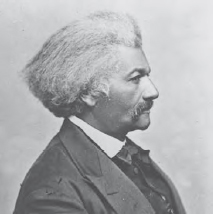American PhilosophyNew England Transcendentalists |
Who was Frederick Douglass? |
Many contemporary scholars of race consider Frederick Douglass (born Frederick Augustus Washington Bailey; 1818–1895) to be the first liberatory African American intellectual. In 1873, he was the vice-presidential candidate when Victoria Woodhull was the first woman to run for U.S. president.
Douglass began life as a slave, but was taught to read at the age of 12 by his owner’s sister-in-law. He taught other slaves to read, and after a series of failed escapes he finally gained his freedom and became active in the Massachusetts antislavery movement. At 23 he began his distinguished and inspiring career of public speaking. He was present at the Seneca Falls convention, where the American suffragist movement originated in 1848.
Douglass toured Ireland and England in the mid 1840s, and his supporters raised money to legally purchase his freedom in 1856. Back in the United States, Douglass published newspapers, the most famous of which was The North Star,which had as the motto “Right is of no Sex—Truth is of no Color—God is the Father of us all, and we are all brethren.”
In the 1850s, Douglass spoke for school desegregation in New York. During the U.S. Civil War, he promoted the rights of blacks to fight for the Union. When the Emancipation Proclamation was issued in 1862, he said: “We were waiting and listening as for a bolt from the sky … we were watching … by the dim light of the stars for the dawn of a new day … we were longing for the answer to the agonizing prayers of centuries.”
In 1884, after his first wife had died, Douglass married Helen Pitts, a white suffragist from New York. Pitts had worked on Alpha, the nineteenth-century radical women’s publication, while living in Washington, D.C.
Douglass’ main writings are A Narrative of the Life of Frederick Douglass, an American Slave (1845), The Heroic Slave: Autographs for Freedom (1853), My Bondage and My Freedom (1855), and Life and Times of Frederick Douglass (1881; revised, 1892); he edited The North Star from 1847 to 1851, after which it became the Frederick Douglass’ Paper.

